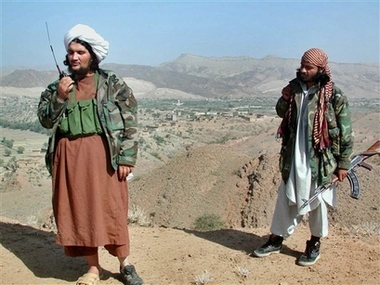Rockets kill 10 in NW Pakistan
(AP)Updated: 2007-07-25 16:41
PESHAWAR, Pakistan - Suspected militants fired four rockets into a city in northwestern Pakistan on Wednesday, killing 10 people as they slammed into houses and a mosque, police said.
Police said 10 civilians were killed and that seven police officers were among 40 others wounded.
A confrontation between Islamic militants and the US-backed government of President Gen. Pervez Musharraf has escalated this month after a bloody raid on a radical mosque in the capital, Islamabad, and the redeployment of the army to North Waziristan, the tribal region closest to Bannu.
A key Taliban leader killed himself with a hand grenade on Tuesday to avoid capture - one of more than 300 people who have died in the violence across the country this month.
Bannu and other cities in the northwest have seen a string of shootings and bombings blamed on Taliban militants who have been expanding their influence from strongholds in the tribal belt along the Afghan border.
On Tuesday, a Taliban veteran of Guantanamo Bay who became one of Pakistan's most-wanted rebel leaders killed himself with a hand grenade after he was cornered by security forces, officials said.
The death of Abdullah Mehsud, a stout, round-faced man in his early 30s who lost a leg years ago fighting for the Taliban, was a boost for Pakistani authorities under pressure from the US to crack down on Taliban and al-Qaida militants fighting on both sides of the Afghan border.
Mehsud was wanted in "many terrorist cases," Interior Ministry spokesman Javed Iqbal Cheema said. "He was a supporter of the al-Qaida terror network and an active Taliban commander in Pakistan."
A Pakistani intelligence official, who spoke on condition of anonymity because he is not authorized to talk to reporters, said Mehsud was intercepted on his way back from Afghanistan's Helmand province, where he had fought with the Taliban for the past year or more.
Police surrounded Mehsud and three other men before dawn in the home of an Islamist politician in Zhob, a town 160 miles from the southwestern city of Quetta, officials said. Cheema said security forces had trailed Mehsud for three days before moving in.
"Thanks be to God that only he was blown up and our men were safe," Zhob police chief Atta Mohammed said.
Mehsud was incarcerated in the jail for terror suspects at Guantanamo Bay, Cuba, after he was captured by US-allied Afghan forces in northern Afghanistan in December 2001. It remains unclear why he was released from Guantanamo in March 2004.
He quickly took up arms again, leading local and foreign militants in Pakistan's South Waziristan, a mountainous stronghold of militants in the tribal belt considered a possible hideout for al-Qaida leaders Osama bin Laden and Ayman al-Zawahri.
Mehsud was wanted for the kidnapping that year of two Chinese engineers, one of whom died in a rescue raid by Pakistani commandos. But he escaped a manhunt by the Pakistani army.
Zahid Hussain, an author and expert on Pakistan's militant groups, said Mehsud's defiance made him a hero among fellow militants - even after he adopted a lower profile.
"Even if he wasn't seen, he was an inspiration," Hussain said. "In that way, (his death is) a big gain for the Pakistani forces."
The intelligence official said there was no evidence Mehsud organized violence that has flared across Pakistan since a deadly military raid on a radical mosque in Islamabad this month. Most of the more than 300 people who have died were members of the security forces.
Much of the trouble has been in North Waziristan, a tribal region where a 10-month-old peace deal between the government and militants has broken down.
Washington has described the pact as a failure that gave breathing room to al-Qaida to regroup - and perhaps plot another big attack on the United States.
Pakistan still hopes to resurrect the peace deal, under which tribal elders pledged to evict foreign fighters and stop cross-border raids.
Nevertheless, the army's redeployment in the region, backed by helicopters and artillery, has elicited a fierce response.
On Monday, militants distributed pamphlets in the area warning troops they faced more attacks by suicide bombers who "love death more than you love your salary of four, five thousand rupees, your photos of naked Indian actresses, your wine and kebabs."
On Tuesday morning, the beheaded bodies of two soldiers abducted the night before were found in the Bajur tribal area, north of Waziristan. A note found in the hand of one of the slain men said that spies for President Bush or Musharraf would meet the same fate, said Sardar Yousaf, a local government official.
|
|
|
||
|
||
|
|

